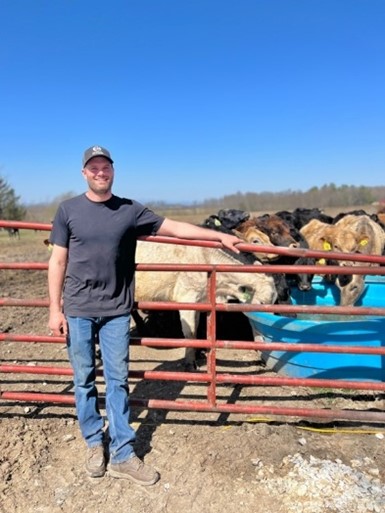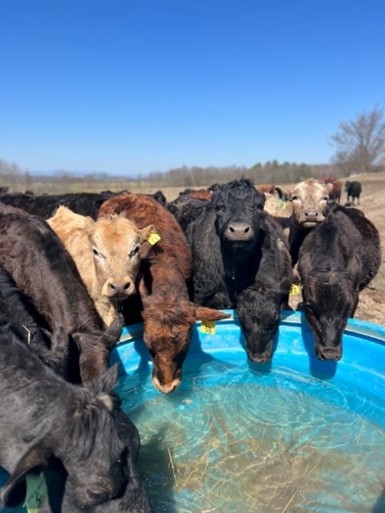By Sarah M. Audet, Communications & Media Consultant, Champlain Valley Farmer Coalition
In the not too distant past, Ramsay Mellish was a typical college student desperate for money. What is perhaps less typical is the job he found to help make ends meet: Relief milker at a dairy farm near his university in New Hampshire.
It wasn’t long before Ramsay became deeply interested in the science of dairy and traded in the ivory towers for metal silos. That’s right: he dropped out of college, became a farmer, and never looked back.
Fast forward to April 2016, when Ramsay and his wife Caroline purchased a farm in Cornwall. They milked exclusively for five years under a contract with Stonyfield.
Unfortunately, when they renegotiated in 2021, it was for a lower price. In order to make up for the lost revenue, they expanded their milking herd from 120 to 180, and started growing organic vegetables at a nearby farm.
This opened the Mellishes’ eyes to the benefits of direct marketing. As one might imagine, it’s a lot of work to build relationships with co-ops and grocery stores. But once you’ve got a boot in the door, it’s much easier to sell them other products.
And that’s how it has come to pass that their organic dairy is now known as Cutting Hill Beef Company. They’ve raised hundreds of cows, selling their meat from Vermont to Rhode Island and everywhere in between.
Ramsay and Caroline have no plans to stop there with diversification. They are now raising a flock of 1,000 hens for eggs, which will grow to 3,000 by fall 2023. They also have a small drift of pigs for personal consumption, but you can count on finding their retail pork in the near future.
“What we’re doing currently is a big experiment,” Ramsay explains of their multi-species venture.
He is not simply referring to their goal of growing and diversifying their revenue, however.
“As dairymen, we talk about multiple species in our hay,” Ramsay observes. “But many don’t consider multiple species of animals, or even multiple species of ruminants, within the same system.”
He adds, “There’s really interesting diversification ideas that happen at small scales and it’s never implemented at a larger scale.”
And so, the Mellishes are wondering: What are the environmental and economic benefits of raising multiple animal species on the same parcel of land? Can it be done at scale in an effective way?
They believe it can.
“We know that the pastures benefit from having both ruminants and monogastric animals because of the difference in their manure. We know, too, that grazing even different ruminant species within the same pasture impacts the soil ecosystem differently than just one species,” Ramsay explains.
How? Cattle manure is lower in nitrogen and higher in other nutrients, while monogastric manure is higher in nitrogen and lower in other nutrients. Taken together, this creates a balanced diet for the soil.
“We can get the nitrogen basically paid for by the sale of the product from the monogastric animal, whether it’s pork or eggs,” he points out. “If it can be scaled big enough, then you have an excess of these nutrients you can spread on your hay fields.”
There are research-backed benefits to the animals, as well, when there are multiple species on the same land.
“Small ruminants are susceptible to certain types of parasites that cattle are not. And cattle are susceptible to certain types of parasites that small ruminants are not,” Ramsay says. “When you put them in the same pasture, you confuse the parasites and they leave.”
This big experiment is all in service to a grander vision: environmental stewardship.
Ramsay observes, “As farmers, we have a huge impact on the environment. Farmers are essentially responsible for managing hundreds of thousands of acres in Vermont, and we need to be mindful of that.”
This is an excerpt. To read the full story, visit https://tinyurl.com/39p9af8c



